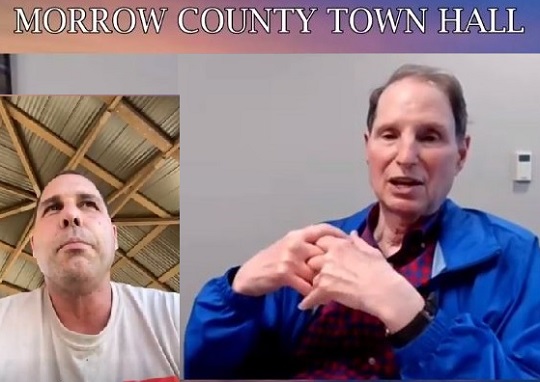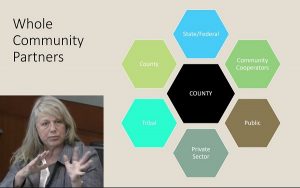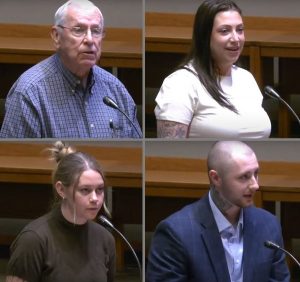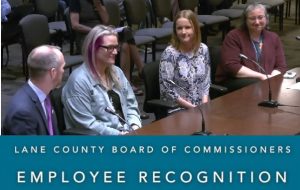Morrow County residents on water crisis: DEQ did nothing
6 min read
Morrow County Commissioners recently declared a public health emergency in response to contaminated well water and groundwater. Sen. Ron Wyden invited citizens to a Town Hall on July 6. He heard from Jonathan in Boardman.
[00:00:14] Jonathan Tallman (Boardman, OR): Hello. Jonathan Tallman. I have a well in Morrow County and there’s many residents in Morrow County that have tested and that are way over the limits of the state and federal limits of nitrates.
[00:00:24] The DEQ has been underfunded and basically silent and in the last four years hasn’t done anything. And so to me what kind of budget or funds to help facilitate the filters for the people that need it, the water testing, and then the enforceability and the violations of these permits.
[00:00:43] Can we get the EPA to come in here and look at these issues? There’s over 2,100 violations and over 261 tons of excess nitrates on the permit that the Port of Morrow has been given. This has entered into the groundwaters and I really have asked for transparency and I’ve asked for specifics of how much water is being used by Amazon because they use the water to cool their data centers and how much water is going out.
[00:01:09] And to me, the reason why they’re over their water nitrates is because it goes into the same lagoons. And I’ve asked them, ‘Okay, well, which lagoon is the potable water, which of the lagoon is the nitrate water?’ and I really don’t get any answers. And I just get thrown to the side as far as asking these transparency questions that are really important, that affects people that are affected by the nitrates in the water. And again, all I want is transparency, but to me, I also want enforceability and I really encourage the EPA getting involved in this because hearing a lack of funding for the DEQ really concerns me, because of all the ties, as far as the people rubbing elbows in the wrong places, that affect the people that are hurt the most.
[00:01:51] John Q: A question in the chat from Kelly in Boardman.
[00:01:54] Kelly (Boardman, OR): Quoting in a recent article, DEQ was asked why it took four years to address permit violations. Their answer was because they’re understaffed and underfunded. Consequently, four years lapsed without oversight or regulation. This agency is in charge of our most precious resource. Are there any federal resources that can fill this gap?
[00:02:13] John Q: Sen. Wyden also heard from Kimberly in Boardman.
[00:02:16] Kimberly (Boardman, OR): I’m going to keep it simple. And I’m going to keep it simple because it’s a hot topic in town (and out of town) is the water, the current water situation, the groundwater situation. And I’m sure you are well aware of it. And will we get any help to fix this or to try to reverse these effects?
[00:02:34] I know it hasn’t really hit city water so bad yet, although we’re having some E. coli issues, but the ground well water for private wells is a huge concern. Is there anything in the works for that?
[00:02:48] Sen. Ron Wyden: Yeah, there is. And I’m working on something called the WASH Act. The Water Sanitation, and Hygiene Sector Development Act, to kind of close the access gap to drinking water and trying to make available grants for areas like this.
[00:03:05] Now, my understanding—and you all can, I’m sure, walk me through this—is that cities like Boardman and Irrigon have municipal water supplies that are overseen by state and local agencies.
[00:03:17] And there are a lot of domestic wells that are outside the city water systems that could be at risk from nitrates. And county commissioners and some businesses are already looking at testing and filters.
[00:03:31] So this is a real problem. Millions live without running drinking water. This is particularly hard on underserved communities with people of modest incomes and rural areas, tribal communities. And a lot of communities didn’t benefit from past infrastructure programs and some are losing services that at one point they had.
[00:03:52] So that’s why I put in this big piece of federal legislation, The Water, Sanitation, and Hygiene Sector Development Act, so that we can start getting at this question of closing the drinking water gap, because we’ve got a host of water systems around this country that really are falling between the cracks and the problem with clean drinking water is real. And I think our bill starts us in the right direction.
[00:04:18] Kimberly (Boardman, OR): Thank you.
[00:04:19] Sen. Ron Wyden: I know that there’s a lot of concern with the water supply not being clean and nitrate high levels, and this is something that’s not an abstract issue. So we’re anxious to work with folks.
[00:04:29] John Q: He also promised to look into immediate help from the federal government.
[00:04:35] Sen. Ron Wyden: The relationship with DEQ and the federal agencies is somewhat unique in that the federal government does have the authority to delegate to state agencies like DEQ. I need to look at exactly how that relationship between the feds and the state work with respect to nitrates, and we’ll have an answer—a better answer—on the relationship between DEQ and EPA on that.
[00:05:02] John Q: He also addressed Jonathan’s request for transparency. At the Town Hall in Boardman, Sen. Ron Wyden.
[00:05:09] Sen. Ron Wyden: And part of what we’re going to try to do in my WASH Act that I mentioned is have the funds to secure the transparency you’re talking about. We ought to be improving data. Having good data means that you have a chance to bring some science to these issues, and not just a lot of political jostling. And so I intend to work with all sides.
[00:05:34] My view on natural resources issues is, you’ve got a choice. You can find a coalition that brings people together, because I think overwhelmingly, people want a water supply that is clean. They understand how important that is for families and the future. I mean, in other words, you can’t get people to come to an area with now-unclean water.
[00:05:58] And the way that you bring people together is, say: ‘Here’s the facts. Here’s the data done by independent scientists,’ not by a bunch of people with election certificates, but by independent scientists, so that you bring everything out in the open in terms of the transparency you’re talking about. And then you say, ‘Hey, let’s now crunch this data together and think it through and look at the various kinds of options.’
[00:06:25] And my hope is that our WASH Act can move exactly in the direction you’re talking about, transparency and improved data on what the options are. Kathleen, Kathy, and Jacob are our staffers over here. They’ll be available to you and to everyone. You know, we believe in working with all of the cross-section of parties here and the heart of the bill is improving data and transparency.
[00:06:51] Jonathan Tallman (Boardman, OR): Well, I look forward to the transparency of it. I still have tons of questions and even at the local level, I’m just not getting the answers and I’m dodged at every avenue.
[00:07:01] John Q: As with J H Baxter in West Eugene, there were repeated violations of the state’s environmental laws. With some water in Morrow County now unsafe to drink, affected residents are eligible to receive bottled water; see the Nitrate Emergency page on the Morrow County website.



